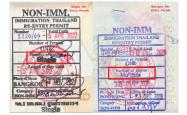Why Must Foreign Directors with Signing Authority in Thai Companies Obtain a Work Visa?
About TMA Group
TMA Group is a professional company focusing on local recruitment and corporate consulting in Thailand, dedicated to providing one-stop services including recruitment, financial management, tax disposal, legal consulting, personnel management, etc. for enterprises and individuals. If you need more advice on investment in Thailand, please feel free to contact us.
— A Legal Interpretation and Practical Analysis Based on the Foreigners’ Working Act
In foreign-invested companies registered in Thailand, many Chinese investors serve as directors (กรรมการ), and some even act as the sole authorized signatory directors. For convenience, some companies allow foreign directors to sign and participate in management without obtaining the appropriate visa during initial operations, but this practice carries significant legal risks.
This article explains, under the current Thai legal framework, why a foreign director with signing authority who performs duties in Thailand must obtain a Non-B business visa and a work permit; otherwise, such conduct constitutes “illegal work,” for which both the company and the individual may be held legally liable.
I. Thailand’s Legal Definition of “Work” is Broad
The primary applicable legislation in Thailand is:
The Foreigners’ Working Act B.E. 2521 and its amended version B.E. 2561 (2018)
Section 5 of the Act clearly states:
“‘Work’ means exerting physical or mental effort to engage in work, regardless of whether wages or other benefits are received.”
This definition explicitly includes any physical or mental action carried out for work purposes, whether or not remuneration is involved. Key implications include:
The concept of “work” is behavior-based, not compensation-based;
Signing documents, managing operations, attending meetings, or giving staff directions all fall under the scope of “work”;
Any foreign individual conducting such activities in Thailand must obtain a valid work permit.
II. Directors’ Duties Fall Within the Definition of “Work”
In actual corporate operations, foreign directors commonly perform the following functions:
Activity | Considered “Work” under Thai Law |
Signing company contracts | ✅ Yes |
Approving financial documents | ✅ Yes |
Attending board meetings | ✅ Yes |
Assisting in business negotiations | ✅ Yes |
Signing to open a bank account | ✅ Yes |
Representing the company in tax or legal matters | ✅ Yes |
Authorizing staff and setting company policies | ✅ Yes |
📌 Conclusion: Once a director holds external signatory authority or is actively involved in business operations and management, such actions constitute “work” and therefore require a Non-B visa and a valid work permit.
III. Legal Consequences: Foreign Directors Working Without a Permit
According to the amended provisions of the Foreigners’ Working Act:
Section 51:
“Any alien who works without a work permit shall be liable to imprisonment for a term not exceeding five years or a fine from 2,000 Baht to 100,000 Baht, or both.”
Section 54:
“Any employer who hires an alien without a work permit shall be fined from 100,000 to 400,000 Baht per alien.”
IV. Common Misconceptions and Risks of Foreign Directors Not Obtaining Work Visas
Misconception | Legal Risk |
Merely holding a nominal directorship or signing without receiving salary | Any act of signing or attending meetings constitutes “work” under Thai law |
Holding a tourist visa or investment visa allows one to work | Illegal—incorrect visa type and absence of a valid work permit |
Infrequent work does not qualify as a violation | Incorrect—even a single act qualifies as “illegal work” |
Internal company oversight cannot detect the violation | In reality, director conduct may be cross-verified through bank account opening, immigration inspection, or tax audits |
V. Recommended Pathways for Legalizing Signatory Directors
Situation | Compliance Recommendation |
The director holds signatory authority and works regularly in Thailand. | Must obtain a Non-B visa and a valid Work Permit. |
The director is not based in Thailand but frequently signs documents. | Recommended to apply for a business visa and authorize a local representative to handle routine signatory tasks. |
The director is the sole authorized signatory. | Strongly advised to legalize their status; otherwise, all external corporate documents carry significant legal risk. |
The company plans to apply for BOI, FBL, or other licensed projects. | The authorized signatory must be a legally resident individual in Thailand. |
VI. TMA Can Assist You in Establishing a Legally Compliant Director Structure
As a professional service provider, TMA offers end-to-end support from company incorporation, director visa application, and signatory structure design to outsourced compliance operations:
✅ Full-process application for Non-B business visa and work permit for foreign directors
✅ Coordination with the Department of Employment and Immigration Bureau for director registration
✅ Legal structuring of Articles of Association and director authorization hierarchy
✅ Optimization of signing procedures (e.g., co-signing or alternate director structures)
✅ One-stop outsourcing for accounting, taxation, HR, social security, and BOI compliance reporting
📧 Contact Consultant: Christina Zhang
📞 +66 065-868-1986
✅ Conclusion: Legalizing directorship is not just a formality, but a responsibility.
Serving as a company director in Thailand is not a nominal role—it entails legal identity and real responsibilities.
Any foreigner who holds signatory authority or engages in company operations must lawfully hold a business visa and work permit.
✅ Legal status protects not only the individual but also shields the company from substantial fines and potential project invalidation.
TMA recommends all businesses design a compliant corporate structure from the outset to avoid serious legal issues arising from unauthorized signatory actions during operations.
TMA Consulting Management has been paying attention to the updating of information through newsletters for many years, but we do not assume any responsibility for the completeness, correctness or quality of the information provided. No information contained in this article can replace the personal consultation provided by a qualified lawyer. Therefore, we do not assume any liability for damages caused by the use or non-use of any information in this article (including any kind of incomplete or incorrect information that may exist), unless it is caused intentionally or by gross negligence.












